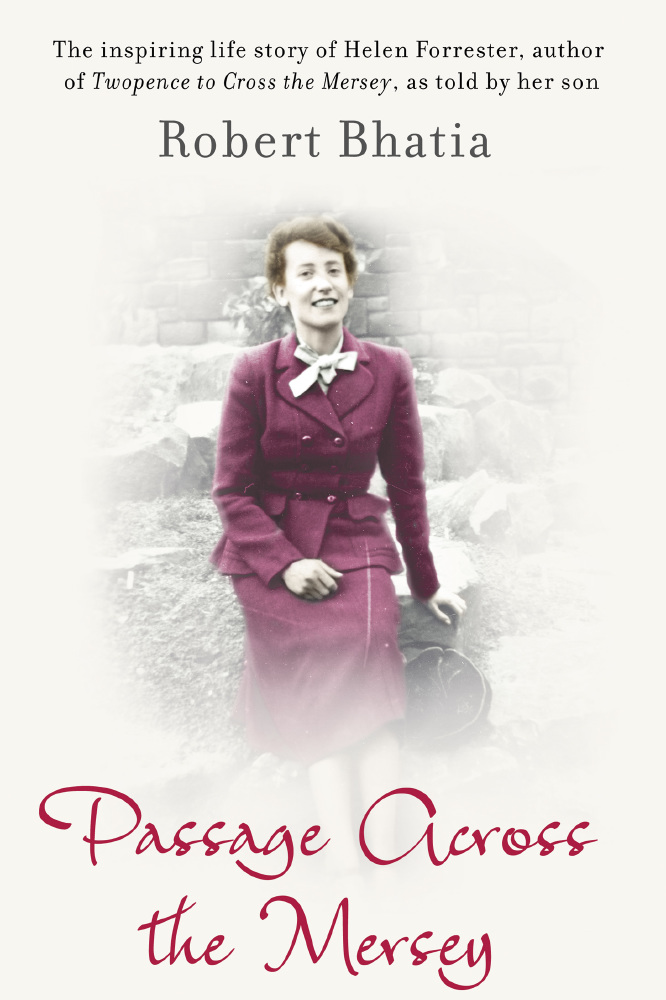By Robert Bhatia - Author of Passage Across the Mersey

Passage Across the Mersey
As the author of Twopence to Cross the Mersey and fourteen other bestsellers, it is not surprising that Helen was a good storyteller. When I was a child, she would tell me classic children’s stories but the best stories were those rooted in her own experience. It was almost as if she was rehearsing what she would write years later.
My mother was exceptionally observant. While writing Passage Across the Mersey, I discovered how much she credited her nanny with this skill. Nanny would take her for walks near Ludlow, Shropshire and teach her the names of flowers and trees. More importantly she taught Helen to observe people and the nuances of their appearance and behaviour.
My mother’s life was affected deeply by the great and terrible events of the twentieth century. Her family was plunged into desperate poverty with the Depression. As a young adult she worked as a social worker and then at a petrol installation, an obvious target in heavily bombed Liverpool. Her vivid description of the war in By the Waters of Liverpool and Lime Street at Two earned her praise from ex-servicemen. Her suffering gave her a steely determination to make the best of her life.
Helen was pulled out of school at age eleven to care for her siblings. She attended night school for years and read voraciously. She read dozens of serious books as research for each of her own books to ensure that they were as accurate as possible. Her hard work was rewarded by the success of her books and Honourary degrees from two universities.
Helen worked in office jobs from the age of 14, taking on more and more responsibility. After the war she held quite a senior position in the packaging industry working with food and cosmetics company clients. As I grew up and heard her stories, I never thought to doubt women’s capabilities in the workforce.
Helen’s first fiancé was a merchant seaman who died at sea during the Second World War. Her second was a soldier who was killed during the invasion of France. Despite these deep losses, she fell in love with my father unreservedly and for life. Within eight months of meeting, they were engaged.
After finishing his studies in England, my father moved back to India and my mother was to follow later to be married. For the next four months, they exchanged letters daily, many of which I have used in my biography of her. Once she got to India, my mother threw her whole self into Indian life, customs and culture. She learned to cook Indian food and to speak Gujerati, the language of the region she lived in. She loved the local village women and taught them the basics of birth control.
Helen always put her family first. Having immigrated to Canada two years before I was born she was committed to helping my father to be successful in his career as a physicist and me to be happy and successful as a Canadian. I remember her playing baseball with me in our back garden.
As I grew older and more self sufficient, writing evolved from a hobby into a full time profession that my mother took very seriously. She worked hard to develop her ideas and disciplined herself to write almost every day. She understood the importance of other people to her success and she maintained good relationships with publishers, booksellers, librarians and, most of all, her readers. She loved to be recognized by a reader in a shop or on the street and would always be sure to tell me about it.
Helen lived in Canada from 1953 until she died in 2011. She wrote thousands of letters to people in England. I remember her sitting at her typewriter writing to friends, family and, increasingly over the years, her publishers, agent, fans and others in the English book world. Her meticulous storage and filing of those letters enabled me to write my biography of her – Passage Across the Mersey.
Learn more at https://helenforrester.com

